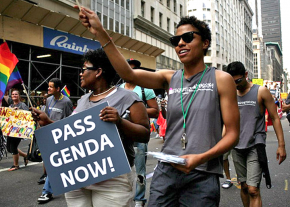Fighting for trans civil rights in Rochester
and report from New York state on the continuing fight to achieve transgender civil rights and equality.
SOME 85 people attended a June 24 rally at the Women's Rights National Park in Seneca Falls, New York, organized by the We Exist Coalition of the Finger Lakes.
Speakers took the stage to speak about topics of trans liberation, race, veteran status, raising transgender children, and the need for solidarity between all oppressed groups. The crowd was diverse, representing all ages and many backgrounds coming together to show support for the transgender community.
In an interview after the event, We Exist Coalition director Shauna O'Toole said that although the organization is newly formed, it is committed to inclusivity of all trans voices, community education and grassroots organizing.
The purpose of the event was to raise awareness of the need for the Gender Expression Non-Discrimination Act (GENDA), which the New York state Senate once against failed to pass this session.
Originally, gender identity and expression protections were built into the Sexual Orientation Non-Discrimination Act (SONDA), which was passed in 2003, but these protections were removed from the bill in order to appease the Republican-controlled Senate.

GENDA was written and introduced the next year as its own bill, but has never even seen the Senate floor, because it hasn't had the support it needed to pass through committee, even when Democrats controlled the Senate in 2008. The New York State Assembly has passed the bill eight times.
Gender expression and identity are often left out when sexual orientation nondiscrimination bills are passed in the U.S. When sexual orientation protections are passed without transgender protections included, it takes an average of 12 years for a transgender nondiscrimination bill to be passed on its own.
Historically, the transgender community in New York state has not been able to rely on larger LGBT organizations for help. In 2016, the Empire State Pride Agenda (ESPA), the largest LGBT lobbying group in New York state, closed its doors--less than a year after the Supreme Court ruled in favor of marriage equality.
Speaking about the group's vote to disband, former ESPA Executive Director Nathan Schaefer told the New York Times, "I think it's a moment to celebrate...we've been incredibly successful."
Considering the fact that not a single piece of LGBT legislation was passed in New York state between 2011 and 2016, ESPA declaring "mission accomplished" left many trans rights activists feeling abandoned.
IN 2015, Gov. Andrew Cuomo declared in an executive action that the legal interpretation of the 1945 New York State Human Rights Law ban on sex-based discrimination would be interpreted to include gender expression. But this kind of legal protection from the state depends on the interpretation of whoever is in office at the time.
Just as Cuomo could easily decide that sex-based discrimination does include gender expression, so too could the next governor decide that it doesn't, resulting in widespread loss of protection against discrimination by employers, landlords, retailers and more.
On June 23, 2012, Barack Obama also gave an executive order instructing the Equal Employment Opportunity Commission, the Department of Justice and Department of Education to provide basic protections for trans people.
Like in New York state, this was done by interpreting existing civil rights laws about sex-based discrimination to include gender expression and identity. Unsurprisingly, Trump reversed these orders also immediately upon taking office. "The fear, which has come to pass, was that these executive orders would be revoked," O'Toole said.
To the Democratic Party and organizations like ESPA, this kind of measure is good enough. But with no guarantee that Democrats will gain any footing in the next elections, or that the Democratic Party will even keep its promises if it does, the assumption that this kind of executive order provides any long-term security to transgender people is shaky at best.
Seemingly every day since Trump's inauguration, transgender people around the country have been reminded that the promises of large LGBT non-profits, commonly referred to as "Gay Inc.", were only ever as good as the continued success of the Democratic Party. With the Democrats still refusing to acknowledge their part in the loss of November's election, we are left wondering where our hope comes from.
It's time to remember the kind of movement that ended the Defense of Marriage Act and won marriage equality, and apply that same strategy to the fight for trans civil rights. If the National Equality March taught us anything, it's that if Gay Inc. is going to join the fight, it won't be until after a mass mobilization of people makes it clear that they have to.
Only by building our own movements from below, which do not live and die in the ballot box, will we have a chance of winning. As we look to the next three and a half years under Trump, we must commit to building a mass mobilization for trans liberation.
Events like Saturday's rally may be crucial first steps to building the grassroots movement we need to win, as long as we keep in mind, as O'Toole put it, "Fighting for civil rights is a never ending struggle."


